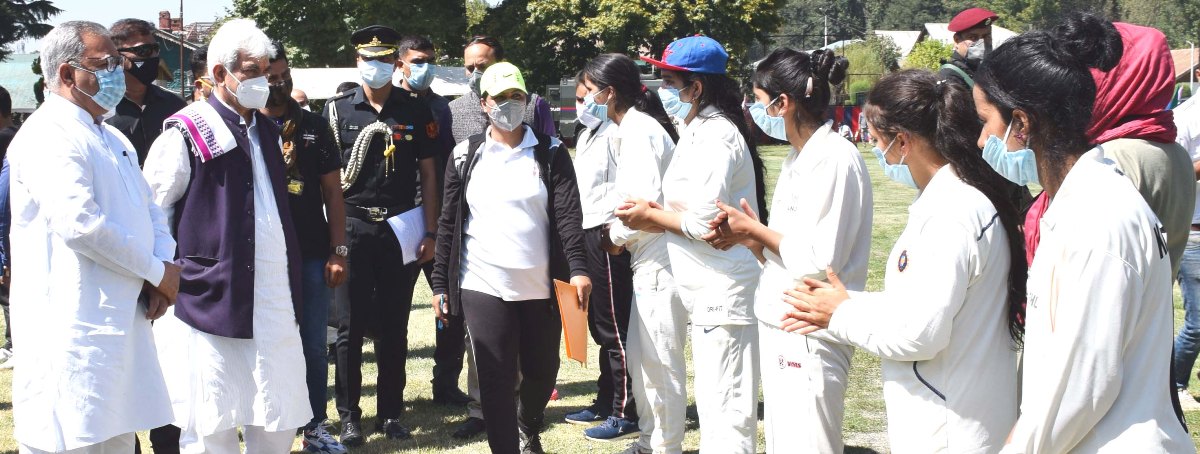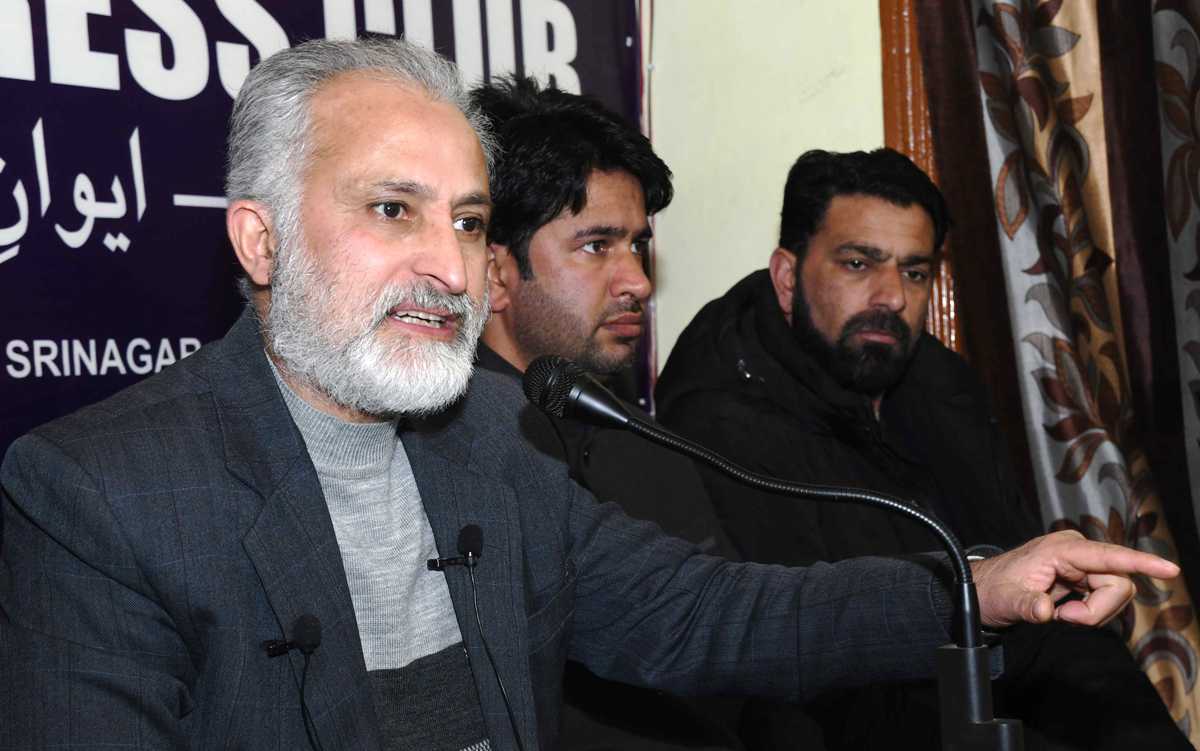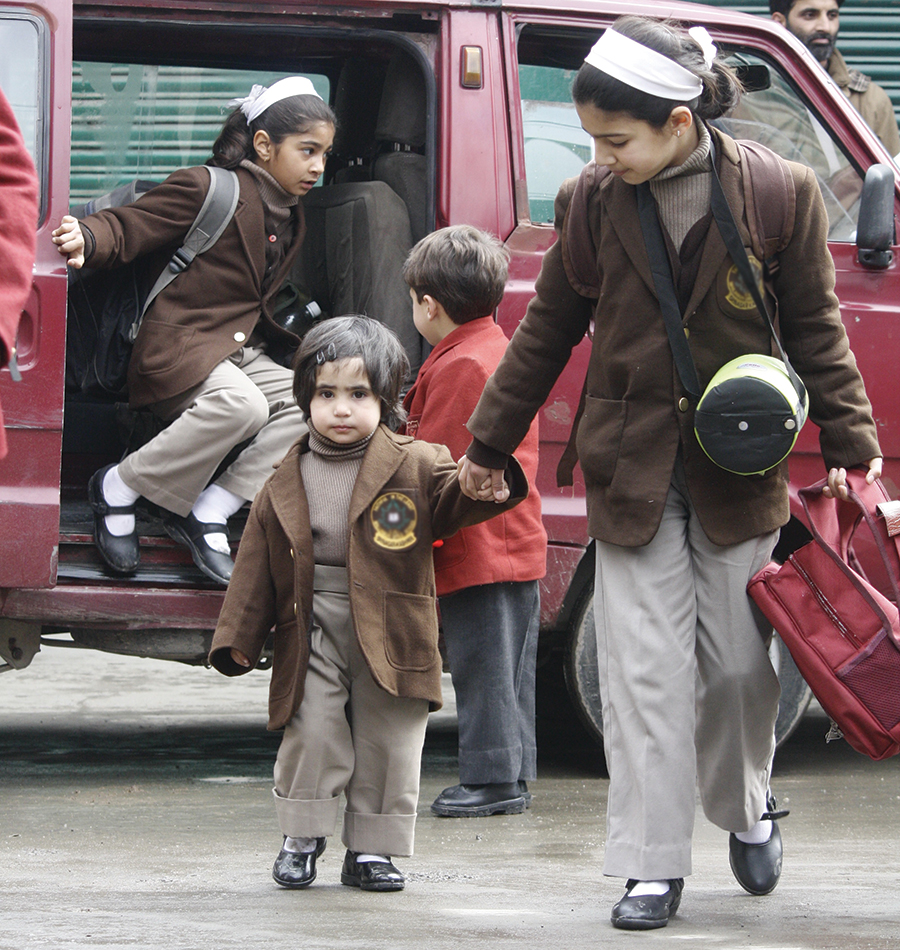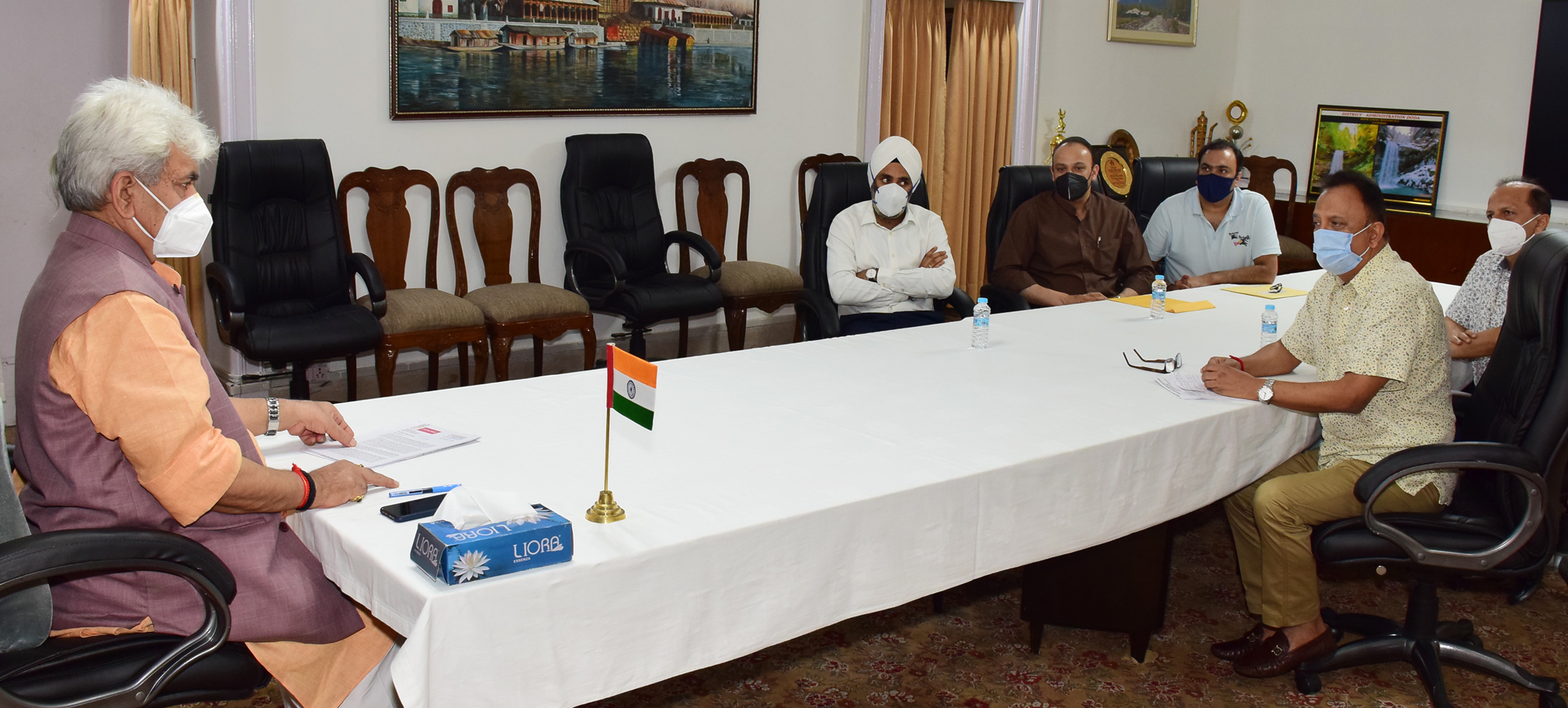So far, Kashmir’s public discourse surrounded the loss of school days and the sluggish 2G in the education’s online circus. Silently but surely, the situation has reached a level that now schools are on distress sale. Some have already been sold if not shut. Caught between the debt-trap and income loss, the development is going to hit the education sector severely impacting the next generation, reports Khalid Bashir Gura and Umar Mukhtar

Lt Governor Manoj Sinha inaugurates Women’s T20 Cricket Tournament on September 19, 2020
Everybody knows that education is the key sector that has borne the maximum brunt of the reading down of Article 370 fallout followed by the pandemic. Initially, the impact was assessed in terms of the number of school days lost. That was impacting the students, who tried to stay educated using the sluggish 2G.
As the crisis prolongs, the impact is manifesting itself from the other side – the crisis is now decimating the institutional infrastructure in the education sector. Now a number of private schools are on the verge of closure. Some are literally on sale, partially, if not wholly.
Most of the educational institutions remained closed for more than six months in the wake of the reading down of the special status that Jammu and Kashmir enjoyed for over 70 years till August 2019. It was only in late February that the educational institutions resumed classes only to be closed again, this time due to Coronavirus pandemic.
Last week, after more than six months, the government reopened the schools for classes 9 to 12. But quite a few students showed up due to the Covid-19 scare. Parents are unwilling to oblige the government given the gradual spike in the pandemic cases. Jammu and Kashmir has already lost more than 1050 individuals and the September witnessed doubling of numbers in comparison to August.
In the deserted building looking decked-up from outside, the crisis inside is creating stories of loss and tragedies. These stories hardly come out.

PSSAK President G N Var addressing a press conference in Srinagar on Friday February 22,2019.
Amid all these months, Junaid Younis, 32, a resident of Bandipora who had completed his MBA from the University of Kashmir had started a primary school in 2019. Younis, however, had not evaluated the worst-case scenarios that are too common in Kashmir. Pandemic was nowhere around when he put his plans to practice.
His heart was always in the education sector. Instead of serving as an employee, he wanted to impart education, create an institution and teach the new generation. However, the lack of resources was a perpetual tension. So he decided to work in the private sector while simultaneously preparing for government a job. In subsequent years he had to subsist on peanuts from private companies.
“I tried to prepare for many government examinations but they disillusioned me,” said Younis. “Most of the vacancies have court stay order on them, some had back door appointments”.
Having started his career as a career counsellor to support his livelihood, Younis’s journey was not as easy. After doing proper market research of the surroundings he lived in, he came up with an idea of starting a school at a rented building, in a small village of Ashtangoo, in Bandipora. Even though there are many government schools in the area, Younis felt the need to start a private school to impart quality education.
“There were very few students who were able to pass high school due to lack of quality education,” he said as he envisions instilling dreams of higher education in the students of his school.
Younis wanted his school to be affordable for diverse backgrounds so that even poor children will also have access to quality education.
Prior to starting school, Younis faced many impediments in getting official approval as he was made to run from pillar to post like his search for a government job. After the education officials inspected his school and gave it the approval, he started with an admission of Rs 1500 to his primary school with a monthly fee of Rs 320.
“Initially my target was 40- 50 students but more than 70 turned up to avail admissions,” he said. “The school started operating from a small rented building with Younis paying monthly charges of Rs 7000 to the proprietor.”
He hired a staff of 5 teachers with good educational qualifications besides non-teaching staff and driver for a minicab was also employed. “I was in deficit but hopeful,” said Younis.
“Many affluent people from the area sent their children to far off places like Srinagar for basic education but not everyone can afford to send their wards to far off places or pay exorbitant fees,” said Younis who wanted to give them hope through his initiative.

Kids on way to school
Finally, Younis seeing his dreams come true as the primary class students were starting to enrol themselves, and the school started to function in February 2020 from the rented accommodation. But only after two weeks, the schools were made to shut again, this time due to pandemic.
This was the second major shock to his initiative. Earlier, when Kashmir was locked down in 2019, Younis’s fledgeling initiative was pushed to an existential crisis. He responded strongly to the crisis and waited for the situation to change. After a few months, as the lockdown was eased, the response to Younis’ initiative was met with enthusiasm in his area. Having worked hard at personal marketing and convinced many willing parents of the importance of quality education which he was planning to provide, his effort appeared to be succeeding.
As the pandemic raged, Younis ‘school faced its litmus test of ensuring education and managing expenses. “I was worried about how I will ensure education as well as payment of the expenses. I could not even ask parents for fees as most of them were not in a position to pay due to crippling lockdown,” said Younis. “They were not earning anything so asking them to pay was impossible.”
When the entire world was getting online education by sitting at home and the student of the Kashmir too with their share of struggle with the 2G speed, most of the enrolled primary students of his school had no access to phones. The challenge was how to reach them amid lockdown.
“Initially, I along with my teachers started preparing written assignments for students so that education is not compromised and I along with my teachers delivered them to their homes,” said Younis. “Once the assignments were collected back, the teachers were disappointed with the output. Later community classes in villages were started in the open spaces by teachers”.
At one point of time in the unending lockdown, Younus ran out of the resources. Since the school is shut and he had to pay salary to his staff and manage other expenses Younis sold his cab that used to bring kids of poor families to his school from far-off areas.
“I had no money to pay to teachers. I sold the only cab that I had bought to ferry kids,” said dejected Younus. He used the money to meet the expenses required for operating the school. As the lockdown has been eased, and the schools have started to reopen, Younis is hopeful with his Hope School.
Just A Test Case
The struggle of Younis is not exclusive as many like him across Kashmir are struggling to manage their expenses and are selling their school assets to bear the expenses.
“The private schools are on sale. They are selling their assets. More than one hundred schools are on sale, especially after successive lockdowns,” said a source privy to the development. This source is in the education sector trying to find buyers for the assets which have become impaired owing to the prevailing situation.
“Most of these schools were started by people who had opted against availing government jobs or were unemployed. They had availed loans to start the schools and are now crumbling under expenses to keep them functional,” the source, talking on the condition of anonymity said.
Most of these schools are selling the property as banks are seeking repayment of the outstanding loans. The Reserve Bank of India (RBI) had put a moratorium on the repayments for six months. The interest accrued on these accounts for the last six months has added the debt burdens of all these accounts. The government is not willing to pay the interest and it has become a larger liability for these enterprises to manage. Since the schools are not earning anything, they find it very difficult to manage the repayments.
As the schools are still closed and the education is online, most of the schools are struggling to meet the expenses of managing the hired staff, teaching as well as non -teaching.
This situation has triggered a new business for special brokers who are finding buyers for these assets, managing distress sales. A broker who is in the process of selling a school said that a boarding high school spread over 10 kanals of land in Srinagar with more than 150 students enrolled in it, is on sale. “Another private higher secondary school has more than 250 students enrolled in it. It is spread over 4 kanals of land and costs around Rs 3 crore,” he said.
His basket is quite huge. He has one school that costs around Rs 7 crore. “This will normally be a property worth Rs 15 crore but the gentleman has to pay Rs 2 crore to the bank and is willing to sell it at this petty price,” he said.
Frequent Crisis
This is a phase, Kashmir’s private education sector has been witnessing quite often. Earlier phases were in the unrests of 2010, and 2016. Earlier the second phase came after 2014 floods. Now the sector is in the midst of fourth such phase. Insiders said it is more dangerous.

Lt Governor e-inaugurating 15 infrastructural projects of the School Education Department
Schools owned by the individuals and the families are facing a serious crisis, especially because their operations were debt-funded. Now they are all in the soup.
Insiders said that most of the schools have sent home most of the staff and those still on payrolls get barely half. “Wherefrom will they manage all this?” one promoter asked. “These are pure commercial exercises.” Some of them, who still want to retain the staff they have invested in, are trying to fund the running costs by selling part of the assets. Some are keen to accept partnerships if it infuses new cash to extend the life of these institutions.
However, the schools run by the charities or groups are still surviving. “We made an appeal to the parents that whoever has assured source of income must deposit their fees and people did it,” one manager of a major school in Srinagar periphery said. “Since we know the parents of the students we teach, we are aware that a section of the parents have no incomes. We are paying out staff half the salary and they operate from home. We did not face any major crisis, so far.”
“Right now 70 schools are on sale,” G N War, who heads Kashmir’s Private Schools Association said. “At least half a dozen have already been sold in recent past.” These include two schools in Budgam with a good reputation having an enrolment of 1000 and 1800 students respectively.
“Till 2014, there were 12 schools teaching CBSE syllabus and the major franchisee chain Kashmir as the private schools numbered around 3200,” Var said. “Now the non-local chains and the CBSE schools have gone up to 142 and our numbers have reduced to 2710. In fact, the numbers have gone down to around 2650 because around 15 schools have already closed down.”
The crisis started after the 2014 floods when, on basis of a complaint to a group of Srinagar schools, the High Court issued a general order asking parents not to pay fees for two months. “It was made applicable to the schools that operated in areas where there was no flood and this proved a death blow to most of them. That marked the fall of the education sector,” Var said. That laid the foundation of economic un-viability of the schools in Kashmir, mostly in the periphery. That time, even a section of parents were willing to pay in areas not impacted by the floods but people eventually took the order route to deny the same to the schools.
Var believes there are only two per cent of schools that are in a position to survive the crisis like unrest and upheavals like August 2019. “Almost 20 per cent are on breakeven and most of the rest are struggling,” Var said. “Falah-e-Aam runs 285 schools but is not able to pay its staff for around year now.”
Nobody knows how many more will be locked once the world bids goodbye to the Coronavirus.
Impairing Part
Most of the schools are facing a crisis on two fronts – the debt funding of their transport fleet and rent. In certain cases, the schools have debt-funded the construction of their premises as well. In the past decade, the school owners were lured to the fascinating packages by the banks to acquire their own fleets. Since all the A-category schools had their own fleets, the B and C category schools jumped in to erase the distinction. This gradually landed them in the debt trap.
The banking sector data available suggests that by the 2019 fall, the overall advances to the education sector were at Rs 533.86 crore. More than two-thirds of this credit belongs to Jammu and Kashmir Bank. This, however, may not include the hefty loans that have funded the transportation part of the education sector and are necessarily including the advances that individuals availed for studying in better institutions.

Lt Governor Manoj Sinha with representatives of unaided CBSE School. PiC DIPR
Now the entire fleet is grounded since August 2019. It hardly moved out of their parking lots. The schools have to pay the insurance and other dues to various regulatory institutions in the government. This is in addition to the debt-servicing. As transport was rarely used in last more than a year, almost eighty per cent of the schools have sent their drivers home.
“Initially, we were paid for six months almost half the salary,” one driver, who was with an old city school for more than two years said. “Two months back, I got a call from my employer saying that the management is not in a position to pay. I am helplessly unemployed. Now I am planning to withdraw the CP fund if there is anything.”
Admitting that most of the operations are debt-funded, Var said the parents owe the private schools Rs 450 crore on account of fees and other dues. “I think it must equal the liabilities that the sector has right now,” Var said. “We have a cumulative fleet of more than 2000 vehicles.”
Intervention Required
In Kashmir, mostly in the urban and semi-urban spaces, the private education sector is the main mover and shaker in the education sector. Owing to the better economic situation and the failure of the state-run education sector, most of the parents prefer enrolling their wards in the privately run institutions.
Var said they teach around 625 thousand students, almost half of the cumulative enrolment of the state-run schools. “We employ 67000 people including 4700 teachers,” Var said, insisting the overall costs in a year do not exceed Rs 1000 crore. “The government spends Rs 12000 crore for teaching 14 lakh students across Jammu and Kashmir. While every scheme and facility is available to them, private schools have no say – even the yearly teachers’ award for the best teacher is select from government-run schools.”
The situation is getting all the more difficult as the key indicators of fresh enrolments have started declining already. In the last meeting of the Project Approval Board, functioning under the Human Resources Development, it was revealed that the number of new admissions across the schools – private and state-run, has declined by exorbitant 175 thousand. The numbers of the out-of-school kids in 2018-19 was a mere 19000. It has grown almost 10 times.
Even the drop-out rate has surged. In the case of students from the majority Muslim community in Jammu and Kashmir, the drop-outs were recorded at 14.30 per cent at primary level, 13.10 per cent at upper primary, 23.70 per cent at the secondary level and 26 per cent at the higher secondary level.
If the government is interested in helping the private sector to stay afloat, it may have to intervene quickly as the Sikkim government did. The education in Kashmir is already suffering. Unlike other parts of Jammu and Kashmir, the private education sector is being seen a totally commercial exercise and not a service.
from Kashmir Life https://ift.tt/3cO0DaV
via IFTTThttps://kashmirlife.net
No comments:
Post a Comment